Click Here To Join Our Telegram Channel for FREE daily tutorials!
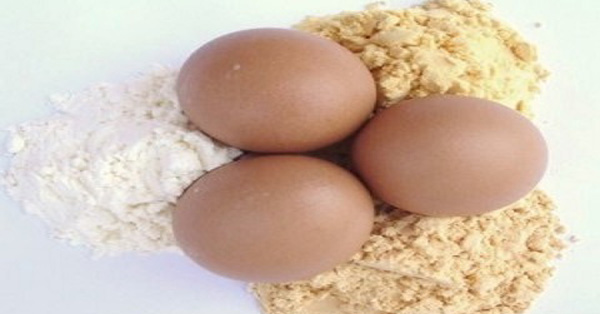
The incredible edible powdered egg…
Despite the at-times negative media attention (we all know how reliable the main-stream media is nowadays) eggs are a very nutritious source of food and one of the cornerstones in baking. A low-cost but high-quality source of protein…. it would be such a great addition to your survival store… if only you could store it.
Well, unbeknownst to many people, eggs can, in fact, be stored up to 10 years if stored correctly in the form of dehydrated egg powder — perfect for bug-out bags, camping trips, and long-term food storage.
They can be used in baked goods just like normal eggs or reconstituted and made into fluffy scrambled eggs.
Here’s how you can do it at home:
What You’ll Need
• A food dehydrator (I use a cheap Walmart version)
• Eggs
• Something to store the powder in when complete
How to Make Powdered Eggs
The process for making powdered eggs is fairly simple. However there are two ways (one which creates a far superior product but more on that later), let me explain the process for both:
(In these examples, I used a half-dozen eggs for the cook-dry method and another half-dozen egg for the wet-dry method)
The Cook-Dry Method
Step 1: Whip up a half-dozen eggs using a blender (for a more complete mixture). And then in a non-stick frying pan, cook the egg solution like you would when making scrambled eggs.
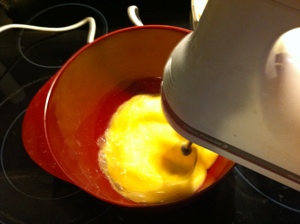
Step 2: Place cooked eggs onto a drying rack in your dehydrator and set the temperature to about 145 degrees Fahrenheit.
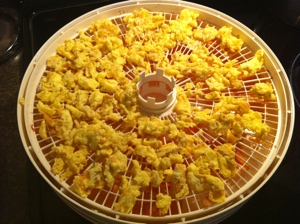
Step 3: Let dry for around 4 hours until completely brittle throughout.

Step 4: Chop dried chunks in a blender or food processor (or coffee grinder) until it has a fine powdery constancy. Bag it and store it away.
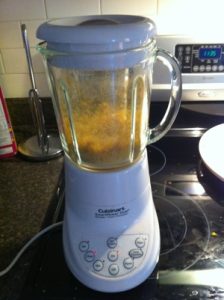
The Wet-Dry Method
Step 1: Lightly grease a fruit roll sheet (it comes with the dehydrator) with a paper towel.
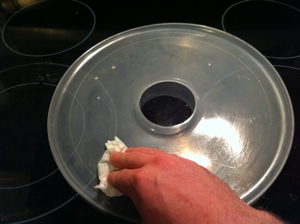
Step 2: Whip up a half-dozen eggs using a blender (not necessary but it does make for a more uniform mixture). Pour the egg slurry into the fruit-roll sheet and set the temperature to about 145 degrees Fahrenheit.
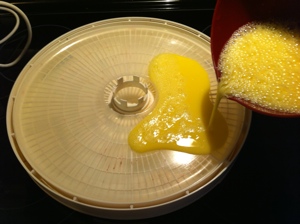
Step 3: Let dry for around 16 hours until completely brittle throughout.
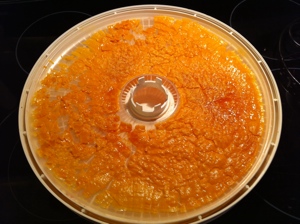
Step 4: Place dried chunks in a blender or food processor (or coffee grinder) until it has a fine powdery constancy. Bag it and store it away.
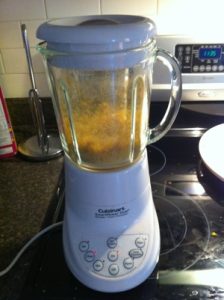
Here’s a picture showing the final result of both the wet-dry and cooked-dry method of dehydrating. Each half-dozen eggs dehydrated produced almost exactly a half a cup of powder. You can also see how the wet dry method produces an orange powder (this color turns back to yellow when reconstituted and cooked).:
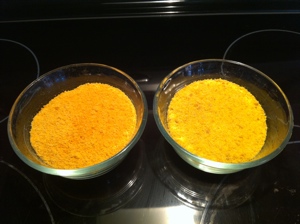
My Results
When comparing the two methods there is most definitely a clear winner — the wet dry method.
This is surprising since most of the information found online and in books explains that you should use the cook-dry method. Their main reasoning is that by cooking them it will kill any potential salmonella bacteria. I find this point irrelevant since after reconstituting them you will be cooking with them anyways (as you would with the original eggs) which will kill the salmonella.
The only advantage I found with the cook-dry method is the quickness of the drying time (four hours compared to 16 with the wet-dry method). Beyond that, when reconstituting the cook-dried eggs and cooking them like scrambled eggs, they have a grainy texture, and they taste dry and stale. They also do not fluff up like normal eggs when cooked in a pan. I assume this lack of “rising” would not work to well in baked goods that require this “leavening” property.
The wet-dry method produces a much better product. Although the powder turns initially orange, when reconstituted and cooked like scrambled eggs, the orange turns to yellow and they taste, look, and feel just like non-dehydrated eggs. They also maintain the “leavening” property and fluff up which is important for baking.
Here’s a picture of the two in powder form with their resultant reconstituted and cooked product:
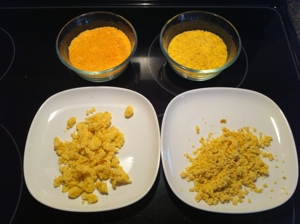
How to Use Powdered Eggs
Uses of Powdered Eggs
Powdered eggs can be used in the same exact manner as regular eggs. The only thing you’ll not be able to do is to create things like poached eggs, or sunny-side-up eggs etc. But for all other needs like baking, french toast, scrambled eggs and so on, you’ll have the same results — but in a much more compact and storage-friendly form.
How to Reconstitute Powdered Eggs
Reconstituting powdered eggs is a simple process. To make the equivalent of one average sized egg mix 1 heaping tablespoon of egg powder together with 2 tablespoons of water. Stir it up, let it sit for 5 min and use as you would normal eggs.
Conclusion
After trying out this process, I’m not sure if it’s entirely worth it to spend 16 hours to make a dozen powdered eggs. I assume if I had a better dehydrator with more than two fruit-roll sheets it would be an easier process, but given what I got it would take 120 hours to fill a #10 can (it fits about 7 1/2 dozen eggs) if I used the wet-dry method (the cooked dry egg taste so bad I wouldn’t even consider it).
Also, since you can purchase really cheap powdered eggs online, equivalent to what you would pay for fresh eggs in the store, makes it even less appealing.
For example, from HoneyVilleGrain.com (where I get my powdered eggs from) you can purchase a six-pack case of #10 cans of powdered eggs for $89.99. This is equivalent to 45 dozen eggs (each can fits about 7.5 dozen eggs) – enough for a year’s supply for a small family.
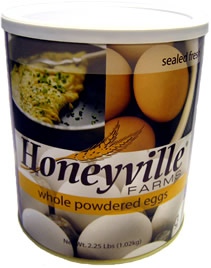
At $89.99 that’s around $2 a dozen. Not too bad.
Where this whole process would definitely be worth it is if you had chickens that produced more eggs than you typically consume. This would help to store up a good amount of eggs when the chickens go through their down phase.
By oovgroov
This Crazy Off Grid Device Literally Makes Drinkable Water From Fresh Air:
According to NASA, the U.S. is expecting a 100-YEAR LONG MEGADROUGHT.
It's already begun. Ask the farmers in California. They know.
Every survivalist knows that water is of critical importance. You NEED an independent water source that you can count on!
As an interesting "survival rehearsal" - imagine that you turned the tap on right now and nothing came out. How long would you last?
But what if there was another water source literally hidden in plain sight. That's right, I'm talking about the atmosphere!
The amazing thing about getting water from the natural moisture in the air... is that it is ALWAYS available.
This gives you real water security!
Learn more about how to tap into "Nature's secret water reservoir" and stay hydrated when TSHTF!
Watch the video:
😳 What Tinnitus Does To Your Brain Cells (And How To Stop It)
After 47 years of studies and countless brain scans done on more than 2,400 tinnitus patients, scientists at the MIT Institute found that in a shocking 96% of cases, tinnitus was actually shrinking their brain cells.
As it turns out, tinnitus and brain health are strongly linked.
Even more interesting: The reason why top army officials are not deaf after decades of hearing machine guns, bombs going off and helicopter noises…
Is because they are using something called "the wire method", a simple protocol inspired by a classified surgery on deaf people from the 1950s...

I Can't Help Showing This Off:
If you haven't heard of Claude Davis yet do yourself a huge favor and watch this video.
One of the smartest guys I ever had the pleasure of meeting, Claude set-up a unique prepping system that changed his life forever.
I already tried it myself and let me tell... you I was completely blown away... His surprising tactics could make your life easier and give you the peace of mind you deserve.
Don't just take my word for it... watch his short video and decide for yourself.

Most People Don't Have The Guts To Try This:
An amazing discovery in an abandoned house in Austin, Texas: A lost book of amazing survival knowledge, believed to have been long vanished to history, has been found in a dusty drawer in the house which belonged to a guy named Claude Davis.
Remember... back in those days, there was no electricity... no refrigerators... no law enforcement... and certainly no grocery store or supermarkets... Some of these exceptional skills are hundreds of years of old and they were learned the hard way by the early pioneers.
>> Click here to find out about them now
We've lost to history so much survival knowledge that we've become clueless compared to what our great grandfathers did or built on a daily basis to sustain their families.
Neighbors said that for the last couple of years Claude has tried to unearth and learn the forgotten ways of our great-grandparents and claimed to have found a secret of gargantuan proportions. A secret that he is about to reveal together with 3 old teachings that will change everything you think you know about preparedness:
>>> Click Here To Watch His Short Video <<<

More Off-Grid And Survival Resources:

What REALLY Happens When You Bury a Shipping Container? (Hint: It's A Bit Crazy...)
Shipping containers are all the rage - but if you are thinking about buying one, you MUST watch this video first:
There's a general belief that if you bury a shipping container you can create an awesome root cellar / storm shelter / survival bunker.
But is a shipping container strong enough to handle the pressure?
Watch the video to see what happens:
What Really Happens When You Bury a Shipping Container? (Click To Watch Video)









I never, never thought about eggs, though it seems SOOO obvious now. Indeed, most of our nutrient sources contain water. Take the water away and they won’t rot. (That is not entirely true for fatty acids, be it oils, margarine or butter, since there the rancid taste comes from oxydization of some of the fats – take away the oxygen and they will not smell rancid even after years – this does not apply to butter as butter contains 20% water, but that’s another story that ties in with the drying methods). Water can be “neutralized” by salting or by sugaring, but that changes the product. Sill, if you absolutely know how much salt you would use with your eggs after rehydrating them, you might even consider adding that sold to the powder for further security.
I’ve seen powdered eggs for sale. But never thought about the process of making it. Thank you for sharing. Very informative.
Good information, and REFRESHING to read the conclusion. Like so many ideas, it is just cheaper and easier to go buy the item professionally prepared and packed. But, good information for when the stores are not available. As I write this, I have a lot of friends in a Central American country that is going thru riots and may lead to full blown civil war. They are already out of food and armed police are coming into homes and businesses and taking what ever food and water they can find.